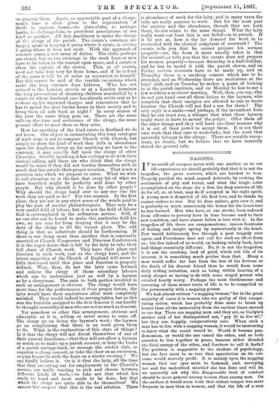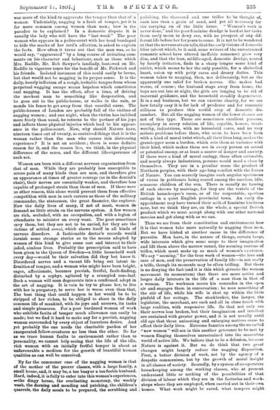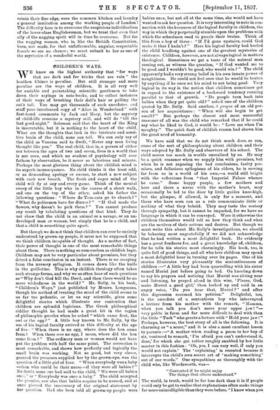NAGGING.
IF we could all compare notes with one another as to our life experiences we should probably find that it is not the tragedies, the great sorrows, which are hardest to bear. Tragedy purified the mind, argued Aristotle, by evoking the sentiments of pity and terror, and what the tragic actor accomplished on the stage for a few, the deep sorrows of life do for all, or, at least, may do if accepted in the right spirit. A young man is despoiled of his first love, and he thinks he cannot endure to live. But he does endure, gets over it, and is probably so much consciously the better for the heart-lore be has learned. Men who have, at one stroke, been reduced from affluence to poverty have in time become used to their new condition, and have almost fallen in love with it. In the tragedies of life there are compensations ; unseen fountains of feeling and insight spring up mysteriously in the heart. Few would deliberately live through a past tragedy over again, and Providence does not call for such an effort from us; but few indeed of us would, on looking calmly back, have had things essentially different. No, it is not the tragedies, it is not the crushing load of grief, which rob life of its interest, it is something much pettier than that. Many a man would suffer far less from the loss of his fortune or the death of his dearest friend than he would from some daily trifling irritation, such as being within hearing of a noisy sleeper or having to do with some stupid person who entailed hourly worry. Perhaps the most burdensome and torturing of these minor trials of life is to be compelled to live permanently with a nagging person.
We had almost written " a nagging woman," for in the great majority of cases it is women who are guilty of this exaspe- rating action, which has probably done more to break up homes than all the immorality from the earliest times onward to our day. There are nagging men, and they are, as Carlyle's mother said of her distinguished son, " gey ill to live wi'," but they are, happily, comparatively rare. When such a man has to live with a nagging woman, it would be interesting to know what the result would be. Would it become pan- demonium, or would the one cancel the other, and so both contrive to live together in peace, because either dreaded the fatal energy of the other, and forebore to call it forth? The problem is suggestive to the student of psychology, but the fact must be so rare that speculation on its out- come would scarcely profit. It is mainly upon the nagging woman that our eyes must be fastened, and, surveying her and the undoubted mischief she has done and will do, we naturally ask why this disagreeable trait of conduct should be more general among women than among men. On the surface it would seem both that violent temper was more frequent in men than in women, and that the life of a mar
was more of the kind to aggravate the temper than that of a woman. Undeniably, nagging is a fault of temper, yet it is far more common among women than men ; how is the paradox to be explained ? In a domestic dispute it is usually the lady who will have the " last word." The poor woman who appears in a police-court with her head bandaged to hide the marks of her lord's affection, is asked to explain the facts. How often it turns out that the man was, as he would say, "aggravated" by a long course of irritating com- ments on his character and behaviour, such as those which Mrs. Raddle, Mr. Bob Sawyer's landlady, bestowed on Mr. Raddle in vigorous tones for the benefit of Mr. Pickwick and his friends. Isolated instances of this could easily be borne, but that would not be nagging in its proper sense. It is the daily, hourly infliction of a rough, irritable tongue from whose perpetual wagging escape seems hopeless which constitutes real nagging. It has the effect, after a time, of driving the meekest man to something like desperation, and he goes out to the public-house, or walks in the rain, or mends his fence to get away from that weariful curse. The public-houses of London are probably full of the victims of nagging women ; and one night, when the victim has imbibed more freely than usual, he returns to the partner of his joys and inflicts those physical injuries which lead to his appear- ance in the police-court. Now, why should Nature have, nineteen times out of twenty, so contrived things that it is the woman rather than the man who causes this distressing experience ? It is not an accident ; there is some definite reason for it, and the reason lies, we think, in the physical difference of the sexes, and the different life-experience of each sex.
Women are born with a different nervous organisation from that of men. While they are probably less susceptible to severe pain of many kinds than are men, and therefore give an appearance at times of greater courage (as in the dentist's chair), their nerves are essentially weaker, and therefore less capable of prolonged strain than those of men. If there were no other reason, this alone would prevent them from effective competition with men in such careers as those of the military commander, the statesman, the great financier, the explorer. Now the daily lives of many, if not of most, women do demand no little strain on the nervous system. A few women are rich, secluded, with no occupation, and with a legion of attendants to minister on every want. The poor sometimes envy them, but they are not to be envied, for they are the iictims of settled ennui, which shows itself in all kinds of nervous disorders. A fashionable doctor's records would inrnish some strange stories as to the means adopted by women of this kind to give some zest and interest to their jaded, aimless lives. Probably the prescription said to have been given to the Queen of Sweden—a little household work every day—would be their salvation did they but know it. Disordered nerves and a vacant life bring out latent in- firmities of temper, and a woman who might have been bright, eager, affectionate, becomes peevish, fretful, fault-finding, disturbed by a zephyr, agitated by a crumpled rose-leaf. Such a woman will soon degenerate into a confirmed adept in the art of nagging. It is vain to try to please her, to live with her is purgatory, to serve her is worse even than that The best thing that could happen to her would be to be stripped of her riches, to be obliged to share in the daily common life of mankind, with its joys and sorrows, its tasks and simple pleasures. For a poor burdened woman of work who exhibits faults of temper much allowance can easily be made; but we find it hard to make any for a peevish, nagging woman surrounded by every object of luxurious desire. And yet probably the one needs the charitable pardon of her exasperated fellow-creatures no less than the other. So far as we trace human faults to environment rather than to personality, we cannot help seeing that the life of the idle, rich woman with an initially fretful temper is about as unfavourable a medium for the growth of beautiful human qualities as can well be conceived.
By far the commoner case of the nagging woman is that of the mother of the poorer classes, with a large family, a small house, and, it may be, a too busy or a too feeble husband. Hard, indeed, it is fully to enter into this woman's experiences, the dingy house, the everlasting monotony, the weekly wash, the darning and mending and patching, the children's quarrels, the daily meals to be prepared, the scrubbing and polishing, the thousand and one trifles to be thought of, each less than a grain of sand, and yet all necessary for the carrying on of the little home. " Woman's work is never done," and the poor feminine drudge is hard at her tasks from early morn to dewy eve, with no prospect of any dif- ferent life before her for years to come. It is not to be wondered at that the nervous strain tells, that the early visions of domestic bliss (about which, be it said, some writers of the unrestrained romantic school have uttered ineffable nonsense) grow very dim, and that the lean, middle-aged, domestic drudge, soured by hourly irritation, finds in a sharp tongue some kind of outlet, which seems to her the only possible, for a shrivelled heart, eaten up with petty cares and dreary duties. This woman takes to nagging, then, not deliberately, but as the apparently one relief for broken nerves. She makes bad worse, of course; the husband stays away from home, the boys are out late at night, the girls are longing to be rid of maternal guidance, and the household steadily degenerates. It is a sad business, but we can exercise charity, for we see how fatally easy it is for lack of prudence and for romantic silliness to produce this sordid crop of domestic dis- comfort. But all the nagging women of the lower classes are not of this type. There are sometimes excellent persons, exemplary in every relation of life, capable, honest, trust- worthy, industrious, with no household cares, and no very serious problems before them, who seem to have been born with a kind of moral twist which, all their lives long, makes the grasshopper seem a burden, which sets them at variance with their kind, which makes them see in every person an actual or potential enemy, or at least a source of danger and anxiety. If there were a kind of moral zoology, these often estimable, and nearly always industrious, persons would need a class by themselves. They are in a peculiar sense the product of Northern peoples, with their age-long conflict with the forces of Nature. You can scarcely imagine such angular specimens of virtue in petticoats being reared among the careless, idle, sensuous children of the sun. There is usually no taming of such shrews by marriage, for they are the vestals of the British housekeeper's room, or of the respectable, spotless cottage in a quiet English provincial town. An early dis- appointment may have turned their milk of feminine kindness sour, but we think they are, on the whole, a special British product which we must accept along with our other national mercies and get along with as we can.
Thus we see from their constitution and environment how it is that women take more naturally to nagging than men. But we have hinted at another cause in the difference of pursuits. Men have, in the nature of things, certain large, wide interests which give some scope to their imagination and lift them above the narrow round, the seeming routine of trifles, which must make up so much of women's existence. We say " seeming," for the true work of women—the love and care of men, and the preservation of family life—is not really a trifle, though its moments may be often trifling. But there is no denying the fact (and it is this which gives to the woman movement its momentum) that there are more active and larger daily interests in the life of a man than in that of a woman. The workman meets his comrades in the open air and engages them in conversation; he sees something of the stir of life, while his wife is shut up within the little pinfold of her cottage. The stockbroker, the lawyer, the legislator, the merchant, are each and all in close touch with large realities, with responsive life. So that not only are their nerves less broken, but their imagination and intellect are sustained with greater power, and it is not usually until old age that these animating and enlarging motives cease to affect their daily lives. Extreme fanatics among the so-called new women" will see in this another grievance to be met by women flinging themselves unrestrained into the masculine world of active life. We believe that to be a delusion, because Nature is against it. But we do think that two great changes might largely reduce the nagging disposition. First, a better division of work, not by the agency of a despotic communism, but by the growth of moral insight in all classes of society. Secondly, by a system of co-operative housekeeping among the working classes, who at present understand little or nothing of the possibilities of that division of labour which they see in the factories and work. shops where they are employed, when carried out in their own homes. What work might be saved, what tempers might
retain their fine edge, were the common kitchen and laundry a'general institution among the working people of London ! The difficulty here is to overcome the suspicions individualism of the lower-class Englishwoman, but we trust that even that ally of the nagging spirit will in time be overcome. But for the nagging woman, who is, like the Britisl Constitution, born, not made, for that unfathomable, angular, respectable female we see no chance ; we must submit to her as one of the mysteries of a wonderful world.




































 Previous page
Previous page